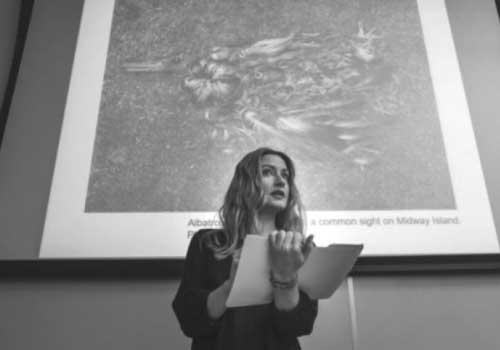Facing emotional impact of a warming planet 直面全球变暖造成的情感影响
2021-07-19李俊娥
李俊娥


When she first started learning about the climate change from one of her elders, Fawn Sharp was invited on a helicopter flight over the Olympic Mountains to survey the Mount Ander?son glacier. But the glacier was gone, melted by the warming climate. Sharp had a deep sense of loss when she discovered the glacier wasnt there anymore.
Loss is a growing issue for people working and living on the front lines of climate change. And that gave Jennifer Wren Atkinson, a full?time lecturer at the University of Washington Bothell, US, an idea for a class.
This term, she taught students on the Bothell campus about the emotional burdens of environ?mental studies. She used the experiences of Native American tribes (部落), scientists and activists, and asked her 24 students to face the reality that there is no easy fix—that “this is such an intractable problem that theyre going to be dealing with it for the rest of their lives”.
Student Cody Dillon used to be a climate science skeptic (懷疑论者). Then he did his own reading and research, and changed his mind.
Dillon wasnt going into environmental work—he was a computer?science major. Yet, the potential for a worldwide environmental catastrophe seemed so real to him five years ago that he quit his job and became a full?time volunteer for an environmental group that worked on restoration (恢复) projects.
Six months into the work, he decided that Atkinsons class was just what he was looking for—a place where he could discuss his concerns about a changing climate.
Atkinson said she hopes the class helped her students prepare themselves for the amount of environmental loss that will happen over their lifetimes.
“We are already changing the planet—so many species are going to be lost, displaced or massively impacted,” she said. “The future isnt going to be what they imagined.”
Choose the best answer for each question.
1. Why did the author mention the case of Fawn Sharp?
A. To lay a basis for Fawn Sharps further research.
B. To prove Fawn Sharps work is similar to Atkinsons.
C. To lead into the issue of loss caused by climate change.
D. To show scientists concern about the Mou? nt Anderson glacier.
2. Whats the main purpose of Atkinsons class?
A. To explore how different people deal with climate change.
B. To get students more concerned about the environmental issue.
C. To find solutions to the environmental is?sue of the Olympic Mountains.
D. To teach students how to conduct resea?rch into the environment.
3. Which of the following best explains “intractable” underlined in paragraph 3?
A. Simple. B. Difficult.
C. Common. D. Interesting.
4. How did Atkinsons class influence Dillon?
A. It made him work as a part?time volun?teer for restoration projects.
B. It made him realize a wide planet cli?mate disaster would happen.
C. It encouraged him to be more involved in environmental protection.
D. It discouraged him to work on restoration projects for the environment.
mind知多少?快来瞧一瞧!
Complete the sentences with proper phrases in proper forms related to “mind”.
[cross ones mind spring to mind
change ones mind make up ones mind
blow ones mind]
1. If something , you find it extremely exciting and impressive.
2. If something , you suddenly or imm?ediately think of it.
3. If something , you have a thought or an idea.
4. If a person , he changes his decision, plan or opinion about something.
5. If a person , he decides which of the two or more choices he wants, especially after thinking for a long time.
